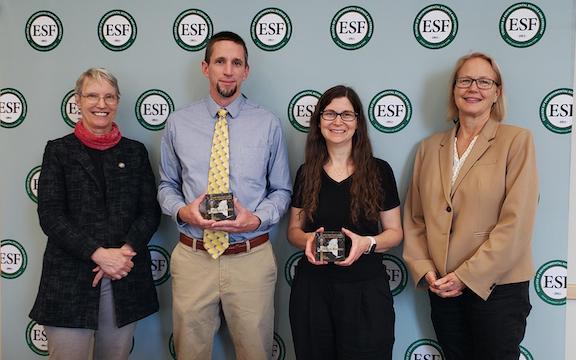Recent Headlines
- Meet the Faculty - Andrea Parker
- ESF President Joanie Mahoney Announces Applications Are Open for the College’s New, Pre-college Summer Engineering Program for High School Juniors, Seniors
- ESF Chemistry Students Present Research at International Conference
- ESF Announces Academic Honors Lists for Fall 2025 Semester

Pictured from left, NYS Senator Rachel May, Dr. Andrew Newhouse, Linda McGuigan, ESF President Joanie Mahoney. Newhouse and McGuigan accepted the award on Drs. Powell and Maynard's behalf.
Senator Rachel May Presents NYS Commendation Award to Doctors Powell, Maynard
Researchers honored for groundbreaking American chestnut tree research
SYRACUSE, NY – Oct. 26, 2023 – Two researchers from the SUNY College of Environmental Science and Forestry (ESF) were honored for their decades-long work to restore the American chestnut tree by New York State Senator Rachel May. Drs. William Powell and Charles Maynard were recognized with the New York State Commendation Award in a ceremony Oct. 25, 2023.
The American Chestnut once dominated the landscape of the eastern United States until a fungus from Asia killed over 3 billion chestnut trees within a few decades. Powell and Maynard’s initial research of the American Chestnut’s “functional extinction” turned into a decades-long project to restore the majestic tree. The American Chestnut Research and Restoration Project at ESF hopes to continue restoration of the tree following completion of the regulatory process.
“We recognize Dr. Charles Maynard and Dr. William Powell today for their work to bring back the American Chestnut tree,” said May. “With their innovative and forward-looking project, they will enhance the lives of generations to come. As these trees thrive and restore our forest, they will give life and habitat to numerous species, and we will enjoy their beauty and the many other benefits they’ll bring. Congratulations on your accomplishments, and it’s an honor to present you with the New York State Commendation Award.”
“We are exceptionally proud of the work Doctors Powell and Maynard have done to restore the American chestnut tree to the landscape,” said ESF President Joanie Mahoney. “Their work is a testament to the power of science, perseverance, and a deep commitment to preserving the natural beauty of our world. We congratulate them on being honored with the New York State Senate Commendation Award, recognizing their outstanding contributions to the restoration of a cherished part of our shared heritage.”
The American chestnut tree had various uses, serving as both a food source and traditional medicine for Native Americans, with its nuts being a significant economic resource in North America, often roasted and sold during the Christmas season. Additionally, the tree's wood was highly prized, known for its straight grain, strength, and resistance to decay, making it valuable for furniture, fences, construction, and various wood products. At the same time, tannins from its bark were used in leather tanning. Notably, "wormy" chestnut wood, featuring insect damage from blight-killed trees, became popular for its rustic character. However, the tree was not favored as a patio shade tree due to its prolific and nuisance-causing droppings, including catkins in spring, spiny nut pods in the fall, and leaves in early winter.
About SUNY ESF
The SUNY College of Environmental Science and Forestry (ESF) is dedicated to the study of the environment, developing renewable technologies, and building a sustainable and resilient future through design, policy, and management of the environment and natural resources. Members of the College community share a passion for protecting the health of the planet and a deep commitment to the rigorous application of science to improve the way humans interact with the world. The College offers academic programs ranging from the associate of applied science to the Doctor of Philosophy. ESF students live, study and do research on the main campus in Syracuse, N.Y., and 25,000 acres of field stations in a variety of ecosystems across the state.